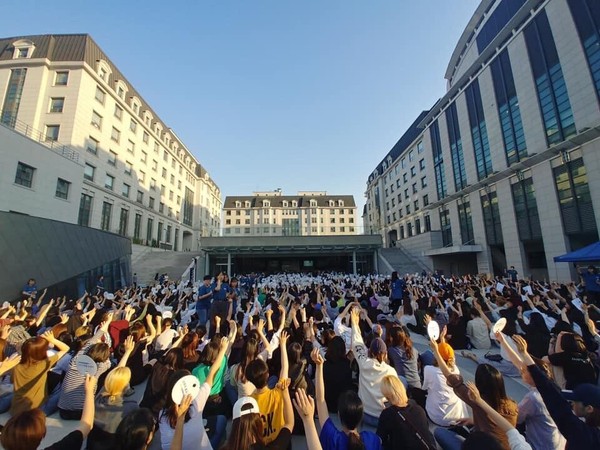
“You must find your rights in the midst of struggle.” This is a key sentence from Rudolph von Yering's book, Struggling for Rights. The struggle he refers to is the eternal labor of the law. There is no law without struggle, just as ownership cannot exist without labor. Students at Sookmyung Women’s University, who watched from the sidelines in silence, broke their silence and began to fight. Through the struggle, they tried to find their rights. The wave of change was triggered on May 23 sparked by the agenda to ‘promote and resolve lack of student participation in the election for university president’. Sookmyungians were polled and the result was 2,908 students participation, one opposing, and 53 abstentions. What will this mean for the future of Sookmyung?
What does participation entail?
A university is a representative institute of higher education in modern society. The Republic of Korea stipulates that universities should serve the nation and humanity and that universities must contribute to democratic education. Recently, at many universities concerned about upholding these stipulations, there has been discussion about reviving direct elections of university school president. Direct presidential election would involve both professors and students having a voice in the school president. This type of electoral system began 31 years ago in 1988 at Chonnam National University, and it has been implemented in accordance with democratization at national universities since 1991. However, in 2012, two decades after the start of that electoral system, national universities such as Chonnam National University, Pusan National University, and Mokpo University, which had held direct elections, stopped their direct elections for some period. The side effects of opting not to have direct elections were illegal electioneering and corruption. As a result, in 2017, direct election for school president reappeared. Ewha Womans University introduced a direct presidential election system in 2017, giving both students and professors a voice in their school president. Since Ewha, there has been a wave of democratic presidential elections at universities. As of 2019, 24 out of 41 state-run universities held direct presidential elections. Also, many private universities in Korea are also starting to hold direct presidential elections or in the process of moving in that direction.
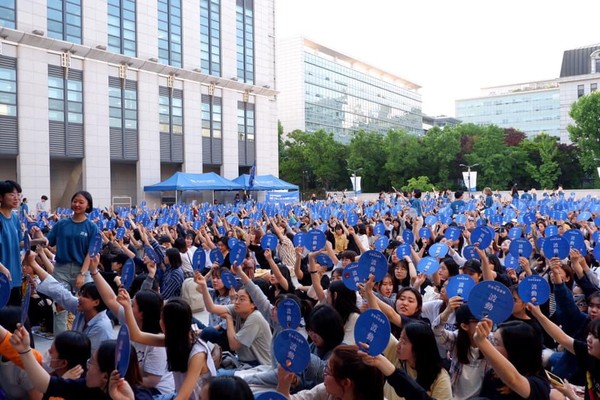
At Sookmyung Women’s University, students are also calling for such elections. Currently, students are excluded from the selection of Sookmyung Women’s University president. The selection process works in the following way: five candidates are selected to campaign for president at a school faculty meeting that is attended by professors currently in office. Then, two final candidates are selected out of the initial five. The university school board makes the final judgment and decision on who will be the next president. The Student Council at Sookmyung Women’s University, Oneul voiced publically that, “The current selection process does not take into consideration student opinion because it is based solely on the views of professors and board members.” Oneul is currently in the process of campaigning to increase the proportion of student opinion voting to 25% of the final decision.
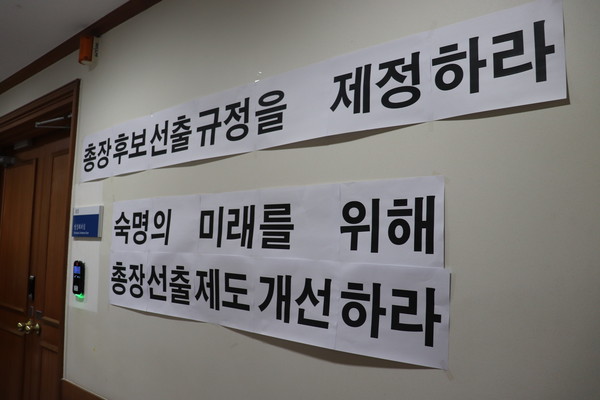
Pre-determined result
Because students are also concerned about the presidential election system at Sookmyung Women’s University, SMT asked Sookmyungians what they think. In response to the question: “Are you in favor of direct presidential elections?”, 92.4% or 61 of the 66 respondents said they were in favor of a direct election system, and the remaining 7.6% said they were “unsure”. This result suggests that most Sookmyungians favor a direct election system. The main reason for the direct election was “because it is the students right to have a voice in who will be the next leader of the school”. This reason was followed by 42 out of 66 students who said, “student welfare will be expanded through general direct elections”. 10 students said they wanted a direct election “because they believe in the work, continuous publicity and events, by the Student Council”.
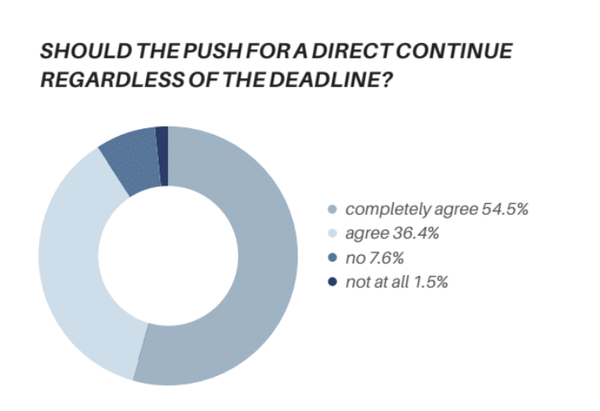
A considerable number of students favor direct election of the next president and their opinions through various activities at school. Students want to see change at the school and if change in policy has been implemented. When asked, “Do you think progress has been made since the general assembly of students?”, 4.5% said “very much”, 45.5% said “yes”, 30.3% “normal”, and 18.2% replied with “no” and 1.5% said “not very much”. While a considerable number of students felt change had been made, 11.5% still did not sense any major changes in reality. This finding suggests that the progress towards a direct presidential election will be slow and prolonged. In fact, when asked “Should the push for a direct election continue regardless of the deadline?” 54.5% said “completely agree”, 36.4% said “agree”, 7.6% said “no”, and 1.5% said “not at all”. In addition, 97% (64 respondents) said they would launch a petition campaign to win the right to hold a direct presidential election, 60.6% (40 respondents) said they would participate rallies, 43.9% (29 respondents) said they would draw up a large self-help plan, and 3% (2 respondents) said they go on a hunger strike. Oneul said “It is seeking its rights in a relatively specific way.”
What should we do?
At present, many schools throughout Korea are trying to implement direct presidential election systems. As mentioned earlier, Ewha Womans University is now directly electing school president by incorporating student votes in the voting count for the first time in its 131 year history. Jung Yoon-ji, a student in the Special Education Department at Ewha Womans University, said, “Because we now have a say in the next president, we are guaranteed a president who is more attentive to students and is truly represented of the entire school body. Also, the efforts by students to achieve direct elections have made many students aware of the importance of voting and their duties as members of society.” Because direct election guarantees the participation of all school members, it aids in the development of individual students. Korea University, Hongik University, and Dongduk Women’s University have also given students more voice in the election process. In May, the Student Council of Kookmin University held a press conference calling for the establishment of a presidential electoral system that guarantees student participation. Lee Joonbae, president of the Student Council at Kookmin University, also said, “We will stage an indefinite hunger strike until the school agrees to engage in dialogue with us.”1) As such, many schools in Korea, including Sookmyung, are also making similar demands from their school administrations.

With more students gaining interest in the need for direct presidential elections, more Sookmyungians are showing their passion for such a system at Sookmyung Women's University. According to a survey of Sookmyungians, when asked to comment on the following statement: “A direct presidential election system should be continuously debated until it’s resolved,” 7.6% said “not sure”, but 36.4% and 54.5% responded with “true” and “very true”. No respondent had a strong negative view towards a direct presidential election. Students’ interest and passion are not expected to end, so deans of colleges on campus are planning group events from September to make the desire for a direct election public. The College of Social Sciences said it plans to hold a mock vote in October to give students a better perspective of the type of president they want for Sookmyung, and as a means of examining needs. The College of Music said it plans to change the computer screen in its buildings to campaign for direct elections of university school presidents and adapt popular songs so that they can be introduced and arranged on IPTV. With Colleges joining students, many are in agreement that it is time to acknowledge the voice of students. Furthermore, the Student Council ‘Oneul’ will hold an assembly on October 8.
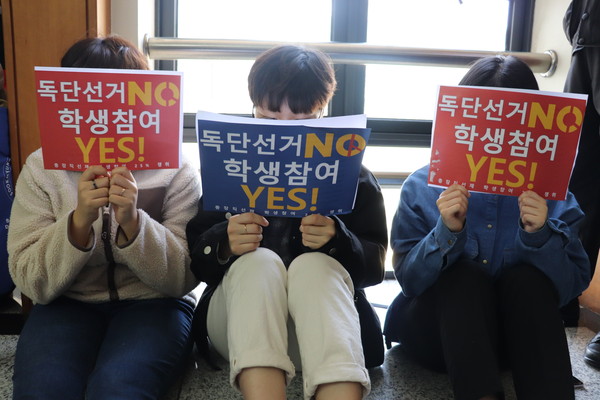
Still a work-n-progress
Many universities are expected to continue their direct presidential campaign in the hopes of democratization and it is expected to be the beginning of proper liberalization and democratization of education. Since a school's true owner is its student, the right direction for a win-win situation is direct elections rather than ignoring the cries and earnest hearts of students at Sookmyung Women's University. School needs to know that students' enthusiasm will continue and will not be suppressed. They will stay unified until they regain their rights in the struggle.
1) Shin Hayoung, “Private Universities’ Needs for the Presidency-Elect System”, Edaily, May 22, 2019
Jung Kim Hyeseung / Reporter
smt_jhs@sookmyung.ac.kr
Oh Hwang Junhee / Reporter


